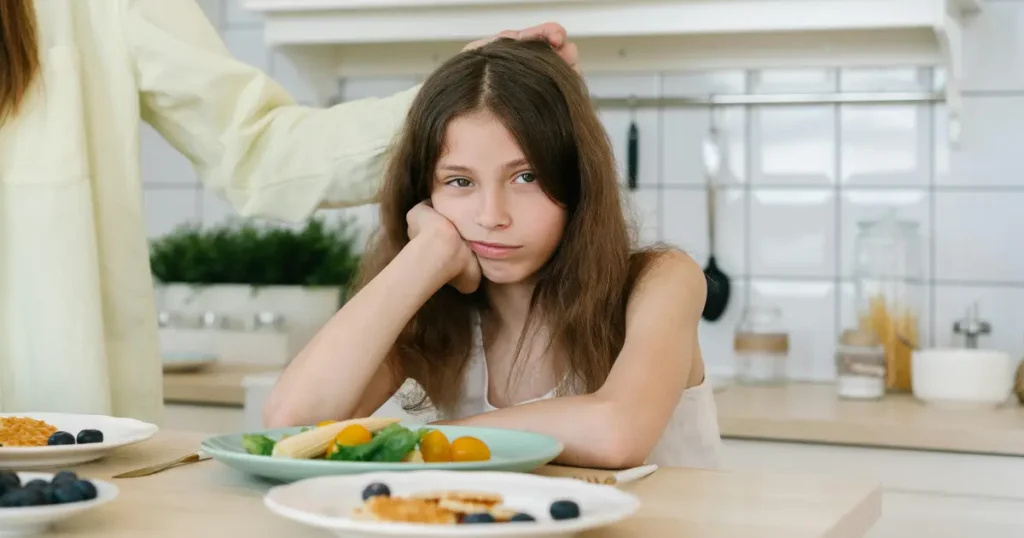
Introduction—Divorce Hurts More Than You Think
My daughter never cried during the divorce. But her silence said everything.” – Karen, mother of a 16-year-old
Ever catch your teen zoning out, blasting music, or snapping for no reason—and wonder, “Is this just hormones… or is she really hurting?”
The effects of divorce on teenage daughters often don’t show up in tears—they show up in slammed doors, skipped dinners, and “I’m fine” replies. The truth is, girls may appear to have everything under control, but inside, they are struggling. It’s a war zone of confusion, guilt, and pain that they rarely talk about.
According to the American Psychological Association (APA), teenagers from divorced couple homes are twice as likely to struggle with anxiety, depression, and relationship issues down the road.
This guide isn’t just more fluff. We’re peeling back the layers your daughter won’t show you—and giving you real, doable ways to support her without pushing her away.
Let’s talk about what really matters—her heart.
Effects of Divorce on Teenage Daughters

Divorce doesn’t just break a marriage—it rattles a teenage girl’s entire sense of safety. While parents are busy navigating lawyers, custody, and chaos, many teens are left to quietly sort through a tidal wave of emotions they don’t know how to name, let alone explain.
1. Emotional Instability, Sadness, or Suppressed Grief
Some girls cry. Others don’t say a word. Either way, the emotional instability hits hard. Teenagers may go from being quiet and sad to getting angry quickly. It’s not “just hormones. It’s suppressed grief. They might think they need to “stay strong,” especially if younger siblings are involved.
You may want to read: Shocking Effects of Divorce on Teenage Sons—The Hidden Pain
2. Academic Decline and Focus Issues
One week, she’s at the top of her class, and the next, she’s missing assignments and skipping school. The effects of divorce on teenage daughters often show up as slipping grades or zoning out in class. When home feels like a minefield, emotional worry makes it hard to concentrate.
3. Trust Issues in Relationships and Friendships
When the two people she trusted most split, it’s no surprise that trust issues creep into her social life. Friend trouble may get worse. She might pull away from her boyfriend or ghost her best friend. Why? It feels risky to trust someone at this moment.
You may want to read: Mother Daughter Relationship After Divorce: How to Heal Together
4. Anxiety, Depression, and Withdrawal
She starts to feel anxious all the time. She might not talk to people as much, lose interest in things she used to enjoy, or worry all the time about how to keep her parents from fighting. According to CDC data (2024), 1 in 3 teen girls conveyed feeling persistently sad or hopeless, and divorce plays a big role.
5. Sudden Maturity or Role Reversal (Parentification)
Some teenage daughters grow up overnight. She could begin to “parent” her mom, work as a therapist, or take care of her younger siblings. This role reversal is called parentification, and it can leave deep emotional scars if it goes unchecked.
It’s not just “phases.” They’re signs your daughter’s world has been shaken. Don’t worry, though; we’re only just beginning. Up next, we’ll talk about what causes these reactions—and how you can step in without pushing her away.
You may want to read: How to Stop Raising a Teenage Brat Right Now
She’s Not Saying It, But She’s Hurting Inside
Teenage girls are pros at hiding what’s really going on. When you inquire about her well-being, you are likely to receive a nonchalant shrug, an eye-roll, or the familiar response, “I’m fine.” But what’s behind that cool front? It looks like she’s starting to fall apart.
Blame, Fear, and Shame She Won’t Admit
Many daughters secretly blame themselves for the divorce. Others are terrified that love never lasts. Some feel ashamed that their family isn’t “normal” anymore. These emotions may not always be expressed openly, yet they persist, contributing to their feelings of insecurity and unease.
You may want to read: Quotes About Teenage Life Lessons That Hit Too Hard
Behaviors That Hide the Hurt
Crying isn’t always a sign of pain. For some girls, it shows up as perfectionism—trying to be the “good kid” so nobody worries. For others, it’s sarcasm, snapping at everything just to keep people at a distance. And then there are the quiet ones—isolating, disappearing into their rooms, or scrolling for hours just to avoid real life.
Reading Between the Lines
If she doesn’t say it out loud, watch what she does. Is she suddenly obsessed with grades? Does she avoid spending time with her family? Does she engage in arguments without any apparent cause? These are often emotional SOS signals. The effects of divorce on teenage daughters aren’t always loud—they’re subtle, quiet, and sometimes simple to miss.
She does not need to be forced to talk. She needs presence, patience, and someone who notices the things she’s not saying.
You may want to read: Teenage Daughter Grieving Loss Of Mother—How To Be There
Why Teenage Daughters React Differently Than Sons

Ever wonder why your daughter shut down after the divorce, while your son just kept playing video games like nothing happened? That’s not just personality—it’s biology, psychology, and a whole lot of pressure rolled into one.
Teenage Brain Development and Emotional Regulation
Teen girls and boys process stress differently. The female brain develops faster in areas linked to emotional response, which means girls often feel more and think deeper about what’s happening around them. Girls are more likely to overthink, worry, and dwell on things when their parents break up.
You may want to read: Toxic Home Life: Parents Fighting Effect On Teenager
Identity Formation and Social Comparison Pressure
During the teen years, your daughter is figuring out who she is, and the divorce shakes the foundation beneath her. Add social media to the mix, and now she’s comparing her “broken family” to every “happy” influencer out there. That pressure can crush her self-esteem and make her feel like she’s the only one who doesn’t fit in.
Girls Internalize Pain, Boys Externalize It
Here’s the kicker: girls often turn pain inward—they’ll blame themselves, withdraw, or develop anxiety. Boys? They tend to act out—getting into confrontations, disobeying regulations, or simply blowing it off. That’s why the effects of divorce on teenage daughters can be harder to spot. They sink instead of yelling.
So, if your daughter is not “acting out,” don’t assume she’s okay. She may be struggling quietly, and silence can be more dangerous than noise.
You may want to read: When a Son Loses His Mother—How to Be There
The Hidden Emotional Cost of Father Absence
“I felt like I didn’t matter anymore once Dad left.” – Anonymous teen girl, 15
When a dad moves out, it’s more than a change of address—it can feel like abandonment to his daughter. It can be hard to feel emotionally distant from him, even if he’s still nearby. For many girls, that disconnect leaves a mark that doesn’t fade with time.
Losing the Father-Daughter Connection Hurts More Than You Think
The father-daughter relationship recreates a significant role in how girls see themselves. When that bond weakens during or after divorce, teenage daughters often feel rejected, unworthy, or invisible. The emotional pain does not dissipate on its own; it manifests in their ability to trust others, particularly men.
You may want to read: Worried For My Daughter After A Breakup: Help Her Now
How It Affects Confidence, Dating, and Future Relationships
Girls who grow up feeling emotionally distant from their dads may enter relationships looking for validation or avoiding closeness altogether. They might struggle with self-worth, set low standards, or trust too quickly—or not at all. The effects of divorce on teenage daughters don’t stop at home—they ripple into adult life.
What Dads Can Still Do
Fortunately, there is hope. It’s not too late. Dads don’t have to live in the same house to stay close. What matters is a consistent emotional connection—text her, show up when you say you will, ask about her day, and really listen. Little things can help her remember, “You still matter to me.”
For her, the divorce doesn’t matter—what matters is whether Dad continues to be there for her heart.
You may want to read: How To Stay Out Of Your Daughters Relationships: Trust First
The Post-Divorce Mother-Daughter Clash

When the dust settles after a divorce, things can get tense, especially between moms and teenage daughters. One minute you’re crying together, the next you’re slamming doors. Sound familiar?
Emotional Mirroring: When Her Mood Feels Like Yours
After divorce, many moms and daughters start mirroring each other’s emotions without even realizing it. If Mom is frustrated, depressed, or overwhelmed, her daughter will typically mirror that back. It’s not rebellion—it’s emotional spillover. Your daughter is soaking in your pain, even if she doesn’t show it.
You may want to read: Unlock How to Deal With a Teenage Girl Who Lies
Guilt-Driven Parenting and Blurred Boundaries
Divorce guilt is real. You might give in more than you should, avoid setting limits, or try to be her best friend. But this loss of boundaries can backfire fast. Teens still need structure—even if they act like they don’t. Without it, they can feel more anxious, confused, and out of control.
Turning Conflict into Connection
You’re not broken just because you don’t always agree. Try these simple shifts:
- Listen first—even when she’s yelling.
- Say, “I’m hurting too, but I’m still your mom.”
- Avoid personalizing every mood swing.
- Set clear rules with love, not guilt.
The effects of divorce on teenage daughters may turn into power struggles, but they don’t have to. With steady support, honesty, and boundaries, you can rebuild the trust that divorce may have shaken.
She doesn’t expect you to be perfect. She just needs you to keep showing up.
You may want to read: Why Is My Daughter So Clingy: Uncovering The Hidden Reasons
When Divorce Breaks Her Sense of Identity
“Who am I now that my family is broken?” This question haunts many teenage daughters after divorce. Their whole world—once defined by family—suddenly feels shaken.
Self-Worth Tied to Family Stability
For teenage girls, family is a big part of who they are. When parents split, it can feel like their sense of self is falling apart too. They may wonder if they are less worthy because their home environment has changed. This feeling really hurts their confidence and makes them doubt their worth everywhere, not just at home.
Body Image and Personal Value Shifts
Divorce can stir up feelings of insecurity that go beyond emotions. Many teenage daughters struggle with body image issues or start comparing themselves to others more than before. When their family life changes, it seems to spark a deeper search for worth, which is often linked to how they look or how popular they are.
This identity crisis is real, and it can affect everything—friendships, school, even how she treats herself.
Understanding this side of the effects of divorce on teenage daughters helps parents know why patience and gentle support matter now more than ever.
You may want to read: Why Is My Daughter So Judgemental? Discover The Truth Now
How Her Friendships and Romantic Views Are Shaped by Divorce

Divorce alters not only the home environment but also the way teenage daughters perceive the world, particularly in relation to their friends and romantic interests.
Fear of Abandonment in Friendships
After watching her parents split, your daughter might worry that friends will leave her, too. This fear of abandonment can make her cling tightly to certain friends or push others away before they get too close. It’s her way of protecting herself from more harm.
You may want to read: My Daughter Finds Fault With Everything I Do: How To Deal?
Risk of Over-Dependency or Emotional Shutdown
Some girls become over-dependent, relying on one or two friends for all their emotional support. As one person put it, they shut down completely, afraid to trust anyone again. Having both reactions is a way of coping with the pain of family changes.
Negative Patterns in Early Dating Relationships
Divorce can also shape how a girl approaches romance. Girls who have seen unstable relationships at home may either rush into relationships to feel safe or decide not to date at all. Unfortunately, such experiences can lead to unhealthy patterns, like staying in bad relationships or fearing intimacy.
Understanding these behaviors as part of the effects of divorce on teenage daughters helps you guide her gently toward healthier friendships and love later on.
You may want to read: 10 Teenage Girl Problems With Parents (And How to Stop)
Emotional Intelligence: Teaching Her to Heal and Feel
Divorce can flood a teenage daughter with feelings she doesn’t know how to handle. Teaching her to name emotions instead of stuffing them is a game-changer.
Naming Emotions vs. Stuffing Them
When she puts a name to what she’s feeling—like sadness, anger, or confusion—she gains power over those emotions. She can process and heal better if she talks about or writes down her feelings instead of keeping them inside.
You may want to read: Teenagers and Privacy in a Hyper-Online World Now
Journaling, Art, Music, and Reflective Tools
Encourage her to express herself through journaling, drawing, or music. These tools let her explore feelings without words and reduce stress. A song or picture can sometimes say more than words ever could.
Modeling Emotional Regulation as a Parent
Kids learn by watching. Suppose you stay calm during tough moments and talk about your feelings. Honestly, you’re teaching her how to handle her emotions. The best thing you can do for her is show her it’s okay to be sad and move on.
Building her emotional intelligence now lays a foundation for stronger mental health and healthier relationships down the road, helping her bounce back from the effects of divorce on teenage daughters with real strength.
You may want to read: Long-Term Effects Of Losing A Parent As A Teenager: Hidden Scars
Mental Health Red Flags Parents Often Miss

Divorce can shake up a teen’s world so much that mental health struggles hide in plain sight. Parents often miss the early warning signs because they don’t look like what they expect.
Anxiety and Depression Masquerading as Mood Swings
Your daughter’s rapid mood swings may seem like normal teen problems. But when mood swings are extreme or last for weeks, they could be signs of anxiety or depression, which are common in teens facing parental divorce.
You may want to read: 4 Types of Unhealthy Mother-Daughter Relationships: How to Spot
Eating Disorders, Sleep Changes, and Physical Symptoms
Notice if your teen suddenly skips meals, overeats, or loses sleep. Sometimes, emotional pain manifests as physical symptoms like headaches, stomachaches, or exhaustion. These can all be hidden cries for help.
When Sadness Becomes Something More Serious
Feeling down is normal after divorce; however, if sadness lasts more than two weeks or if she expresses feelings of hopelessness, it’s time to take action. Early support by a counselor or therapist can make all the difference.
Keeping an eye on these mental health red flags helps you catch the deeper effects of divorce on teenage daughters before they spiral out of control.
How to Shield Her—5 Protective Parenting Practices
Divorce shakes up everything for your teenage daughter. But with the right steps, you can help her feel safe, seen, and supported through the storm.
1. Daily Emotional Check-Ins and Rituals
Make it a habit to ask, “How are you really feeling today?” Even a quick chat during breakfast or bedtime shows you care—and gives her space to open up.
2. Choose Co-Regulation Over Control
Instead of pushing her to “snap out of it,” try co-regulation—staying calm together, breathing through tough moments, and helping her manage big feelings without pressure.
3. Help Her Build an “Emotional Survival Kit”
Work together to find go-to tools that help her cope, such as music playlists, journaling, or talking to a trusted friend. Having a personal toolkit helps her stay in charge when life gets too much.
4. Reinforce Safety Through Structure and Love
Keep routines steady and rules clear. Teenagers need structure, especially after a lot of chaos. Also, give her many hugs and tell her you love her no matter what.
5. Avoid Emotional Parentification
Don’t expect her to be the “adult” or fix family problems. She needs to be your child, not your therapist.
These five steps set the foundation to protect her emotional well-being and help her navigate the effects of divorce on teenage daughters with resilience and hope.
Parenting as a Team—How to Co-Parent With Compassion

Divorce doesn’t have to mean parenting alone. Your daughter feels safer when you and your ex-spouse work together, even if things are a mess.
What to Say and NOT Say About the Other Parent
Avoid badmouthing or blaming your teen in front of others. Instead, speak respectfully and focus on what’s best for her. Negative comments can make her feel even more confused and hurt.
Unified Emotional Messaging
Try to send the same message about feelings and rules, whether she’s with Mom or Dad. When she receives mixed signals regarding what is acceptable, she might feel nervous and uncertain about her position.
Consistency in Parenting Expectations Across Homes
Agree on basic rules—like curfews, chores, and screen time—in both homes. When expectations remain consistent, she knows what to expect and feels safe.
Co-parenting with compassion helps reduce the effects of divorce on teenage daughters by showing them that a caring team still surrounds them.
Rebuilding Trust and Emotional Security in Her Life
Trust can suffer when divorce shakes up family life. However, it’s never too late to make your daughter feel safe and close again.
Encourage Vulnerability by Showing Yours
Let her see your real feelings. Sharing your struggles and how you cope teaches her that it’s okay to be open and honest about hers.
Apologize When Needed—Model Humility
Say sorry if you mess up or lose your cool. Owning mistakes shows her that no one is perfect—and that trust grows when we’re real, not flawless.
Create New Traditions That Feel Safe and Sacred
Start small rituals like weekend movie nights, Sunday dinners, or morning walks. These fresh routines give her something stable to hold on to and help her make positive experiences.
Rebuilding trust and security takes time, but with patience and care, you can soften the effects of divorce on teenage daughters and help them feel grounded once more.
When and How to Seek Outside Help
Sometimes, your daughter needs more than family support to heal from divorce. Knowing when and how to get help makes all the difference.
Signs She’s Ready (or Resisting) Therapy
It might be time to think about therapy if she has been distant for weeks, talks about being lost, or does dangerous things. But she may also resist, fearing judgment or change. With some time and gentle support, you can help her feel safe enough to try.
Teen-Focused Therapy Types
Different approaches work well for teens:
- CBT (Cognitive Behavioral Therapy): Helps her spot and change negative thinking.
- Expressive Arts Therapy: Uses drawing, music, or writing to express feelings without words.
- EMDR (Eye Movement Desensitization and Reprocessing): A procedure that helps process trauma linked to divorce.
How to Choose a Therapist She Can Trust
Look for someone who specializes in teen therapy and understands family separation. Involve your daughter in the decision-making process whenever you can. Letting her have a say builds trust. Good therapists listen to her without passing judgment, ensuring she feels heard.
Getting professional support is a strong step toward healing and easing the effects of divorce on teenage daughters.
Personal Story: “She Shut Down for Months… Then One Day She Spoke”

When our divorce became final, my 14-year-old daughter barely said a word. She came home from school, went straight to her room, and only spoke when necessary. Still, I told myself that she just needed some time. But as the weeks and months went by, I was afraid that I’d lost her mentally for beneficial reasons.
I tried everything at first—pep talks, surprise outings, even pretending like nothing had changed. None of it worked. The way she rolled her eyes and shut her door showed that she wasn’t ready. I felt helpless, ashamed, and angry all at once.
Then a friend gently asked me, “Are you listening, or just trying to fix her?” That question hit hard.
So, I stopped talking so much. I just sat with her. I would occasionally sit outside her door. Occasionally, we were seated at the kitchen table. I began to say things like, “I’m here whenever you’re ready.” No pressure.” I also sought help from my therapist to process my guilt and fear, which prevented me from unloading on her.
It wasn’t overnight. After a few months, she came into the living room one afternoon and said, “I miss when we used to have movie nights.” “May I do that again?”
That one sentence cracked open the silence.
We started rebuilding slowly. I made errors and encountered challenges, but supporting her and allowing her the necessary space proved to be more effective than attempting to intervene directly. Even though therapy was beneficial, it was our quiet times of unconditional presence that really helped them improve.
This experience taught me that teenage daughters hurt deeply—but silently—and that love often sounds like silence, patience, and a seat at the edge of her pain, not a solution to fix it.
Final Thoughts—You Can Be Her Safe Place Again
Divorce may shake your daughter’s world, but it doesn’t have to break her. With steady love, safe boundaries, and intentional support, it can become the very experience that shapes her into a resilient, emotionally aware young woman.
The effects of divorce on teenage daughters are deep and complex, often hidden behind silence, sarcasm, or emotional withdrawal. But here’s the truth: you still hold tremendous power as a parent. Have the power to listen without changing. You possess the ability to establish a fresh, secure environment, despite any alterations within the family. You can act as a role model for emotional healing rather than hiding emotions.
Yes, you’ll make mistakes. You might say the wrong thing, miss a red flag, or feel like you’re walking in the dark. But what will help her get better are your constant presence, your humility, and your refusal to give up on her.
You are still her safe place. You can also turn back into it.
✨ Keep going. She is observing the way you express your love for her during difficult times.
🔗 Need more support?
Read more posts under our Teenage Parenting category for tools, insights, and encouragement tailored for you.
Frequently Asked Questions
How can I rebuild my teenage daughter’s trust after the divorce?
Consistency, honesty, and emotional presence are essential for rebuilding trust. Show up for her, even if she pushes you away. Validate her sentiments without attempting to resolve them. Apologize for past transgressions and keep your promises. Trust is earned gradually—but steadily—through deeds, not just words.
What if my daughter blames me for the divorce?
It’s common for teens to direct anger at one parent, even unfairly. Don’t become defensive. Instead, address her suffering by saying, “I understand why you’re upset, and I’m here to talk when you’re ready.” If she is patient and emotionally receptive, she will most likely see a clearer image over time. Focus on connection rather than correction.
How do I protect my daughter when my ex is emotionally unavailable?
You can’t control your ex, but you can buffer the emotional impact. Be her constant emotional anchor. Teach her to identify and regulate her emotions. Create a home atmosphere in which she feels seen, heard, and protected. If necessary, consult a therapist to assist her in processing disappointment without carrying emotional burdens for which she is not responsible.









